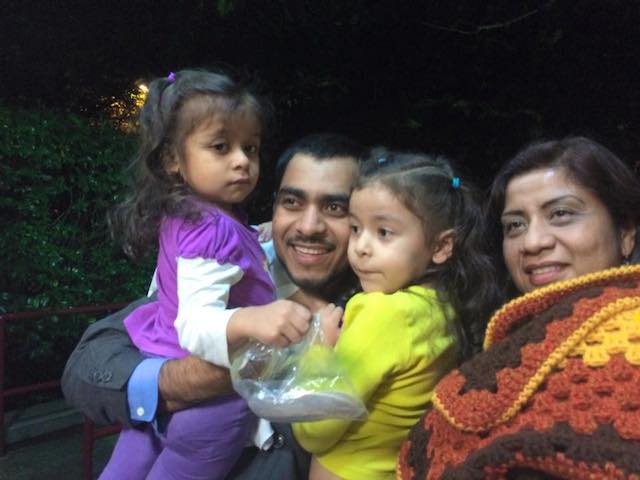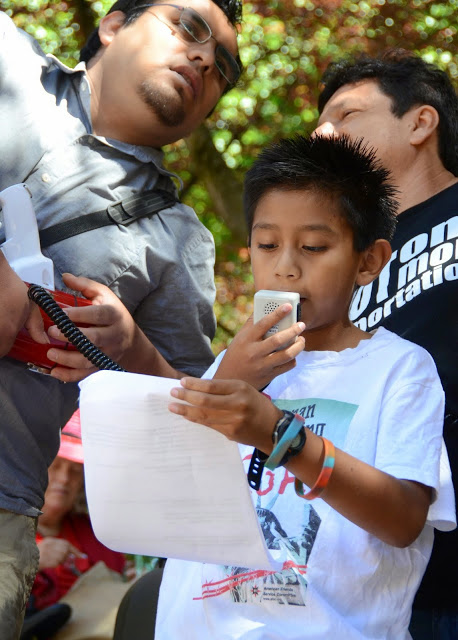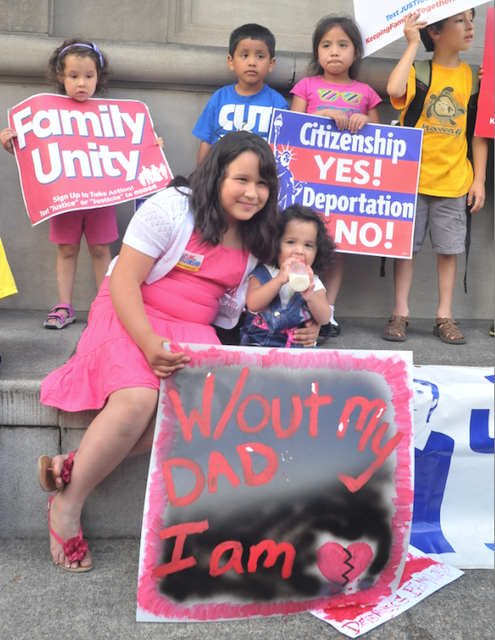Story by Pete Shaw
Francisco Aguirre, the immigrant and labor organizer who is being persecuted by Immigration and Customs Enforcement (ICE) and the Department of Justice (DoJ), will have a trial this Wednesday, October 21, at 11 AM that will determine if he is guilty of illegal re-entry into the United States. The case has profound implications, not only for Aguirre, but also for other immigrants who have fled horrific violence in their home countries.
Aguirre is a person loved by many in this community. He has been tireless in his efforts to help others who share his plight, but do not have as large a platform as he has. He has turned the spotlight that shines in him on all those who share his ordeal. He is as decent a person as I have ever met.
He is also my friend. I believe I wrote those same words a little over a year ago after Francisco was confronted at his home by ICE agents who sought to take him in. He rebuffed them, bravely asserting his rights, and soon took sanctuary in Augustana Lutheran Church.
Francisco was over at my house today. I needed some help doing work in the backyard–moving 4 cubic yards of dirt to be precise–and he gladly lent a hand. Moments like this are rare between us despite known each other for about 13 years now. I have seen him often at various activism events, usually as a participant, marching with one group or another demanding a more just world, always friendly, always committed. He often played guitar and sang at these events, a sweet man with a sweet voice that belies what he has endured and the fortitude that lies within him.
I first met Francisco through two friends of mine. That day he had gotten into a bike accident and broke his arm. He needed some money to pay the bill, and I gave him what I could. I never expected he would pay me back–I was not even sure I would ever see him again. He did pay me back, and his friendship, as with all friendships, has produced dividends that cannot be measured.
Francisco, from El Salvador, has experienced some horrible stuff, far more than I ever have and hopefully ever will. Yet he smiles freely. As do his children, who are as all children should be: happy, curious, and enchanted with a world of wonder that surrounds them. His wife, Dora, is a pillar of strength and a courageous person in her own right.
On the way to my house this morning, Francisco found out that his petition to the judge to toss out his case had been denied. I suppose that should come as no surprise. And no matter Wednesday’s verdict, Francisco should be here another 3 years, as he is applying for a U-Visa that he expects to be granted. That U-Visa, which is available to immigrants who are victims of serious crimes and who have cooperated with authorities in prosecuting the crime, is related to his experiences in El Salvador.
But a guilty verdict Wednesday would make it very difficult for him to get US citizenship after the U-Visa eventually expires. This would make him vulnerable to deportation.
Community resistance to ICE has been strong. Pastor Mark Knutson of Augustana Lutheran Church which provided sanctuary to Francisco, has been one among many stellar people who have worked hard to help Francisco, both for his sake, and for the sake of other immigrants in similar circumstances. VOZ, for whom Francisco has worked, has been there. Jobs with Justice and numerous other faith and justice groups have rallied to his cause. And people who simply understand injustice have come out for him.
It was that pressure from the public that forced ICE to drop its detainer for Francisco, and that public pressure must continue both for Francisco and other immigrants who are fleeing their countries, often because of circumstances that are a direct result of US economic and foreign policy. It is no coincidence that the large numbers of mothers and children who were crossing into the US in 2014 came mostly from El Salvador, Guatemala, and Honduras, countries in which the US has had a strong hand, and in which our impact has been devastating.
As we took a break from moving dirt, sitting on my back porch drinking water in the unseasonably warm Autumn sun, Francisco looked out over the yard and said how nice it would be to have a place where he could grow plants. A few feet in front of us was a pineapple guava. It is a thin, delicate looking tree that in the Spring bears beautiful flowers, pink petaled with long, bright red pistils. This year it bore fruit–a rarity, and a testament to how unseasonably hot it has been.
Francisco told me the guava trees in El Salvador are very different. They have shinier leaves, and the trees are more stout and stalwart. He also told me about another tree in El Salvador, a very large one, that bears inedible fruit. The tree’s flowers are rarely seen. But legend has it that if you lay a cloth under the tree at night, the next morning you will find it covered with blossoms.
History textbooks concentrate on big events, but usually leave out any mention of the hundreds or thousands of smaller events that led to those big events. Francisco’s trial on Wednesday may be one of those small events (although it is certainly huge for Francisco, his family, and his friends). That is up to us. If you have the time, come to the Federal Court House in downtown Portland on Wednesday and show your support for Francisco. It may make a difference and when Francisco and other immigrants receive their overdue justice, you can say that in some way you helped. That is a very good thing.
Francisco Aguirre’s trial is on Wednesday October 21 at 11 AM at the Federal Court House, located at 1000 SW 3rd Avenue in downtown Portland.









